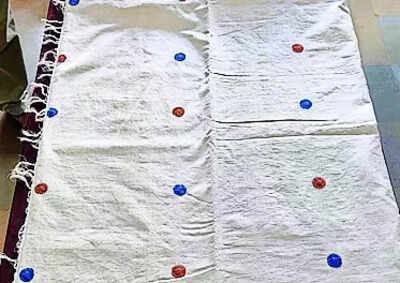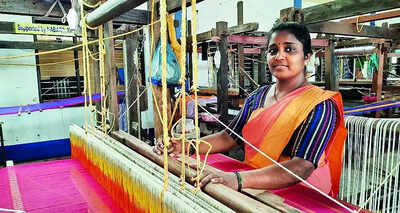- News
- City News
- mangaluru News
- Udupi sari for FM’s daughter underscores product’s revival
Trending
Udupi sari for FM’s daughter underscores product’s revival
Mangaluru: Union finance minister Nirmala Sitharaman was in for a pleasant surprise when a sari was handed over to her by the Admar seer at Udupi Admar Mutt where her daughter Parakala Vangmayi’s wedding with Pratik Doshi was solemnised last week.
The sari was sent along with a note, saying it was a GI-tagged Udupi sari -- a beautiful and authentic pure cotton piece woven in Dakshina Kannada and Udupi districts.
The Udupi sari has been known for more than a century for its variety in terms of design, colour and durability and the one that the Admar seer chose for the minister’s daughter was made from natural dyes of indigo and ‘khata’, with embroidery.
Sari-weaving was once a flourishing industry in Udupi, providing livelihood to more than 5,000 families in the coastal region of Karnataka. However, in recent years, this traditional form of work is on the verge of extinction, with only about 45 weavers, all above the age of 60, left in the profession until around 2018.
A lot of innovation in terms of design and colour has taken place since the initiation of the Udupi Sari Revival Project by the Kadike Trust at Talipady Weavers Society in 2018. Woven for nearly 150 years, since the introduction of the Malabar Frame looms by the Basel Mission of Germany,, these saris also known as Magga, have contrasting colours on the body, border and the ‘pallu’, woven through intricate warp-and-weft patterns.
Made from the finest single-ply cotton yarn and dyed locally, these saris are known for their durability.
Sharing details about the sari that was given to Sitharaman’s daughter, Mamatha Rai, president of Kadike Trust that has been working for the revival of Udupi saris, said: “It was woven by weaver Poornima Shettigar, who is new to this tradition, while the embroidery was done by Rekha, a weaver. Poornima and Reha were both trained by the trust with support from Nabard [National Bank for Agriculture and Rural Development] in 2021-22. When the sari was purchased from the weavers, we had no clue that it would be presented to the minister for her daughter’s wedding.”
The Kadike Trust has also trained 20 weavers with support from Nabard. While it encouraged many weavers who had left the profession to return to the fold, the trust has also extended its support to safeguard the health and welfare of the weavers.
For the first time, with the help of the trust, Udupi saris began to be dyed naturally, thereby further enhancing their beauty and allure.
As a result of the trust’s efforts, the number of weavers has now gone up to 70, with many young weavers joining the profession recently.
At Talipady Weavers Society, where Kadike Trust initiated the revival process, the number of weavers has gone up from 8 to 34 – yet again vindicating the efforts of the trust in breathing a new lease of life in helping revive a dying traditional art form.
The sari was sent along with a note, saying it was a GI-tagged Udupi sari -- a beautiful and authentic pure cotton piece woven in Dakshina Kannada and Udupi districts.
The Udupi sari has been known for more than a century for its variety in terms of design, colour and durability and the one that the Admar seer chose for the minister’s daughter was made from natural dyes of indigo and ‘khata’, with embroidery.
Sari-weaving was once a flourishing industry in Udupi, providing livelihood to more than 5,000 families in the coastal region of Karnataka. However, in recent years, this traditional form of work is on the verge of extinction, with only about 45 weavers, all above the age of 60, left in the profession until around 2018.
Kadike Trust, an NGO based in Udupi, took the initiative to revive this traditional form by supporting the weavers with branding, GI authorisation and online marketing.
A lot of innovation in terms of design and colour has taken place since the initiation of the Udupi Sari Revival Project by the Kadike Trust at Talipady Weavers Society in 2018. Woven for nearly 150 years, since the introduction of the Malabar Frame looms by the Basel Mission of Germany,, these saris also known as Magga, have contrasting colours on the body, border and the ‘pallu’, woven through intricate warp-and-weft patterns.
Made from the finest single-ply cotton yarn and dyed locally, these saris are known for their durability.
Sharing details about the sari that was given to Sitharaman’s daughter, Mamatha Rai, president of Kadike Trust that has been working for the revival of Udupi saris, said: “It was woven by weaver Poornima Shettigar, who is new to this tradition, while the embroidery was done by Rekha, a weaver. Poornima and Reha were both trained by the trust with support from Nabard [National Bank for Agriculture and Rural Development] in 2021-22. When the sari was purchased from the weavers, we had no clue that it would be presented to the minister for her daughter’s wedding.”
The Kadike Trust has also trained 20 weavers with support from Nabard. While it encouraged many weavers who had left the profession to return to the fold, the trust has also extended its support to safeguard the health and welfare of the weavers.
For the first time, with the help of the trust, Udupi saris began to be dyed naturally, thereby further enhancing their beauty and allure.
As a result of the trust’s efforts, the number of weavers has now gone up to 70, with many young weavers joining the profession recently.
At Talipady Weavers Society, where Kadike Trust initiated the revival process, the number of weavers has gone up from 8 to 34 – yet again vindicating the efforts of the trust in breathing a new lease of life in helping revive a dying traditional art form.
Start a Conversation
FOLLOW US ON SOCIAL MEDIA
FacebookTwitterInstagramKOO APPYOUTUBE











